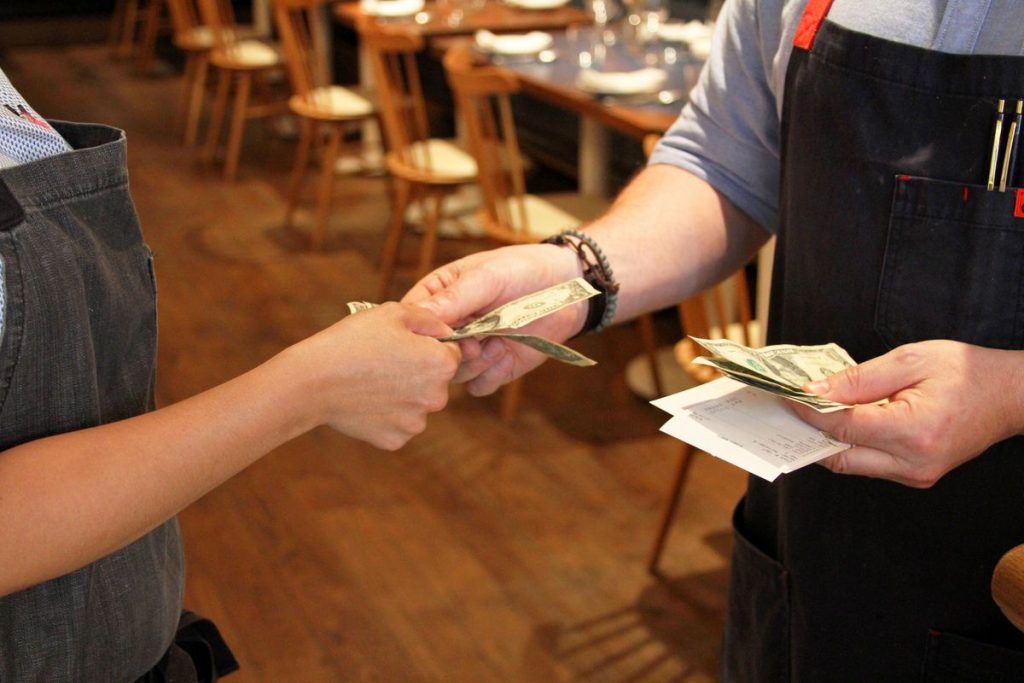Ever wondered how restaurant employees survive on the low wages and minimal benefits? Their jobs become bearable because of the tips they earn from customers in addition to their regular wages. Most restaurants have a system in place for employee tip pooling. In this blog, we’ll explore all about restaurant tips, tip pooling methods, and is tip pooling legal.
What is tip pooling?
In the hospitality industry, a tip is a small amount paid by a customer in addition to their restaurant bill. This tip belongs to the staff only since they are directly responsible for the customer’s dining experience. Tip pooling is a way of distributing these tips amongst the restaurant staff so everyone is fairly rewarded for their efforts.
The process involves collecting (or pooling) every staff member’s tip at the end of a shift and then dividing it. We will get into greater detail about the division process of tips in the coming sections. It is important to note that not all employees may be a part of the tip pool, and certainly not their employer.
Restaurant managers can keep a tip only if the customer directly gives it to them. In all other cases, restaurant managers are not a part of the tip pool. Other staff members who are not a part of the tip pool are the BOH staff as they don’t interact with the guests directly. Hence they don’t get a tip even though their efforts in the kitchen do contribute to the guest experience.
Tip pooling vs tip sharing vs tip credit: What’s the difference?
White the definition may seem fairly easy to understand, but the process of tip pooling isn’t as straightforward as it seems. This is because employers (restaurant owners) need a fair approach to distributing the tips. This is where the differentiation between tip pooling and tip sharing becomes prominent.
While tip pooling refers to gathering all tips in a collective pool and then redistributing it equally, tip sharing works on a percentage basis. It involves tipped employees keeping a percentage of tips to themselves and sharing the remaining with others. These ‘others’ here are the non-tipped staff members like the host/hostess, dishwashers, cooks, and other kitchen staff.

For example, the tipped staff may keep 70% of their tips and share the remaining 30% with the non-tipped staff. Some employers take a different approach and even divide tips amongst staff based on the hours put in at work. Although this is a very complicated way of dividing tips, a lot of restaurateurs find this method fair.
Now that we have clarified the difference between tip pooling and tip sharing, let’s look at the concept of the tip credit. A tip credit, which may sound like an exchange of money, involves the employer crediting a portion of a staff member’s tips. In simple words, the staff member will receive lesser wages if their tips cover the difference.
There are two important aspects to keep in mind if you want to take a tip credit from your restaurant staff. First, make sure your state laws allow tip credits. Second, as per Federal law, the staff member must get at least the federal minimum wage. It is illegal if you pay a staff member less than the minimum wage by crediting their tips.
All of this depends on the policy in place at the restaurant and the legal laws of the state. So before instating tip pooling, tip sharing, or tip crediting policies for your restaurant staff, acquaint yourself with all legal aspects to avoid any issues. Let’s explore the tip pooling practice in detail from a law perspective.
Is tip pooling legal?
As per the Fair Labor Standards Act(FLSA), restaurant staff can be asked to participate in tip pooling or tip sharing. Since tips make up for a large section of a restaurant staff’s income, the FLSA was changed in 2018. As per this new change, employers, managers, or supervisors cannot keep their employees’ tips for any purpose even if they do not claim a tip credit.
As per the FLSA, there is no fixed percentage or amount that needs to be shared by a tipped employee in a tip pool. So it is entirely up to the restaurant management to decide what percentage will be shared, and which staff members will receive the pooled tips. Finally, it is important to fully redistribute the pooled tips to all the staff within the pay period.
Following are some important points to keep in mind when creating a tip pooling policy for your restaurant:
- Specify the staff based on roles that will participate in a valid tip pool
- Draw a tip pooling agreement between the restaurant management and staff
- Verify all federal and state tip credit laws
- Keep in mind all applicable notice requirements
Not all states allow tip pooling (or tip credit). So before you make your staff participate in a tip pool, make sure your practices are compliant with state law. Indulging in tip pooling in an area where it is deemed illegal may attract penalties. Moreover, it can lead to a decline in employee morale and make it difficult for you to find staff for your restaurant.
How to Do Tip Pooling Among Your Restaurant Staff

If not executed correctly, tip pooling can reduce a significant portion of an employee’s income. To ensure there is no wage theft in your restaurant, keep in mind the following tips for tip pooling:
- Define what’s going into the pool:
First and foremost, the restaurant management needs to decide what will go into the pool. Will the staff be required to pool their entire tips or just a section of it? Which employees will be benefiting from the tip pool? The answers to these questions will help in understanding how these tips will be calculated and redistributed. Make sure all the decisions are in the favor of the entire team.
- Share equally:
This is one of the most common tip pooling methods and mostly adopted by QSRs and casual restaurants. So basically the restaurant management asks their staff to put in all their tips together and then redistribute them equally. This type of pooling may not work in fine dining or a bar set up as there are more staff members involved in providing a great customer service experience.
- Share percentages:
In this tip pooling method, staff members contribute some fixed percentage of their tips and keep the rest to themselves. This becomes necessary in a setup that has servers, host/hostess, bartenders, etc. The tip sharing pool may also include bussers and dishwashers. The amount these non-tipped employees will receive varies as per their role within the organization.
What should restaurant owners know about tips?
- Tip Pooling Cannot Detract From Minimum Wage
Tip pooling laws and methods may vary from location to location, but there is one main rule that employers cannot ignore. A staff member’s base wage and tips should add up to at least minimum wage. This is true even if the staff members participate in tip pooling/sharing. While the federal minimum wage is different for different areas, it is currently $7.25 per hour.
- Pooled Tips Cannot Go To Your Employer
Although we’ve been through this point already, we’ll clarify it once again – all tips belong entirely to employees and employers cannot participate in a tip pool. If a tip is left on a credit card, employers can deduct the processing fee before putting the remaining amount in the tip pool.
Benefits of tip pooling:
- Facilitates teamwork:
The best part about staff members sharing their tips is that they end up working as a team. Since everyone benefits from tips, they help each other in ensuring the customer has a good dining experience which leads to higher tips. Such activities ensure that they work as a team to earn tips. This not only improves team coordination but also leads to better restaurant performance.
- Improves employee morale:
Restaurant staff members who participate in a tip pool work together to ensure that the tip pool becomes bigger and everyone gets a good amount from it. Working together to achieve a common goal and receiving the reward for it improves employee morale at work. It makes them feel more responsible for their performance and enhances their individual productivity.

Cons of tip pooling:
If you thought tip pooling only comes with a set of pros, here are some tip pooling challenges that prove it may not be as easy as you think.
- Can create workplace conflict:
A lot of times, tipped employees may find it unreasonable to share their earned tips with other staff members. This could be because underperforming employees too get an equal amount from a tip pool. In such situations, hard-working employees can harbor resentment and feel that their hard-earned money is being unfairly distributed to those who don’t deserve it.
- Employees can get away with bad performance:
While most employees will be motivated to contribute as much as possible to a tip pool, some may take undue advantage of it. Some employees start slacking in their performance which hurts the overall share of high-performing employees. This can leave high-performing employees feeling that tip pooling is unfair and doesn’t adequately compensate them.
In conclusion:
While it has its cons, tip pooling can help in keeping the overall staff performance positive. Since everyone has a part in ensuring the guest experience is good, tipped employees work harder than others to ensure the tip is satisfactory.
It’s best to be aware of all the associated laws and then create a tip pooling strategy for your restaurant. In addition to this, don’t forget to clearly communicate the procedure to your staff members and keep communication channels open to build a strong restaurant culture.
